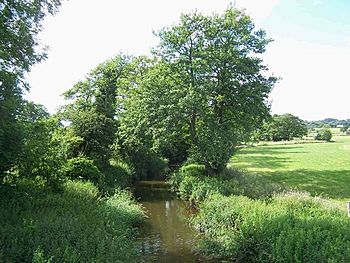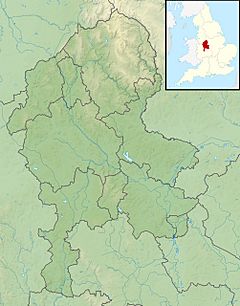River Blithe facts for kids
Quick facts for kids River Blithe |
|
|---|---|

Blithe near to The Blythe
|
|
|
Confluence with the River Trent shown in Staffordshire
|
|
| Country | England |
| Counties | Staffordshire |
| Physical characteristics | |
| Main source | Heywood Grange Farm, Staffordshire |
| River mouth | King's Bromley, Staffordshire 52°45′21″N 1°49′54″W / 52.75580°N 1.83163°W |
| Length | 29 km (18 mi) |
| Basin features | |
| Basin size | 167 km2 (64 sq mi) |
| Tributaries |
|
| Progression : Blithe—Trent—Humber | |
The River Blithe is a river found in Staffordshire, England. It is a tributary (which means a smaller stream or river that flows into a larger one) of the River Trent. The Blithe flows for about 18 miles (29 kilometers) from where it starts to where it joins the Trent.
What's in a Name?
The name 'Blithe' likely comes from an old English word. This word means gentle, cheerful, quiet, or merry. This name fits the river well. The River Blithe flows as a calm and gentle stream for most of its journey.
The River's Journey
The River Blithe begins its journey in the hills east of Stoke-on-Trent. It starts near Heywood Grange Farm, about 800 feet (244 meters) above sea level.
As it flows, several smaller streams join the Blithe. Even with these additions, the river is still quite small when it reaches Caverswall.
The river then passes the village of Blythe Bridge. It generally follows the railway line that runs from Stoke to Derby. The area around the river is mostly farmland.
The Blithe then turns south and flows into the Blithfield Reservoir at Newton Hurst. After leaving the reservoir, it continues southeast for about 5 more miles. It passes the village of Hamstall Ridware. Finally, the River Blithe meets the River Trent at King's Bromley.
Blithfield Reservoir: A Watery Wonderland
The River Blithe flows into the Blithfield Reservoir. This large reservoir is located between Stafford and Burton-upon-Trent. The South Staffordshire Water Company built it, and it opened in 1953.
The reservoir is a very important source of drinking water for South Staffordshire. But it's not just for water supply! Many fun activities happen here too. People enjoy Angling (fishing) and sailing on the reservoir's waters.


